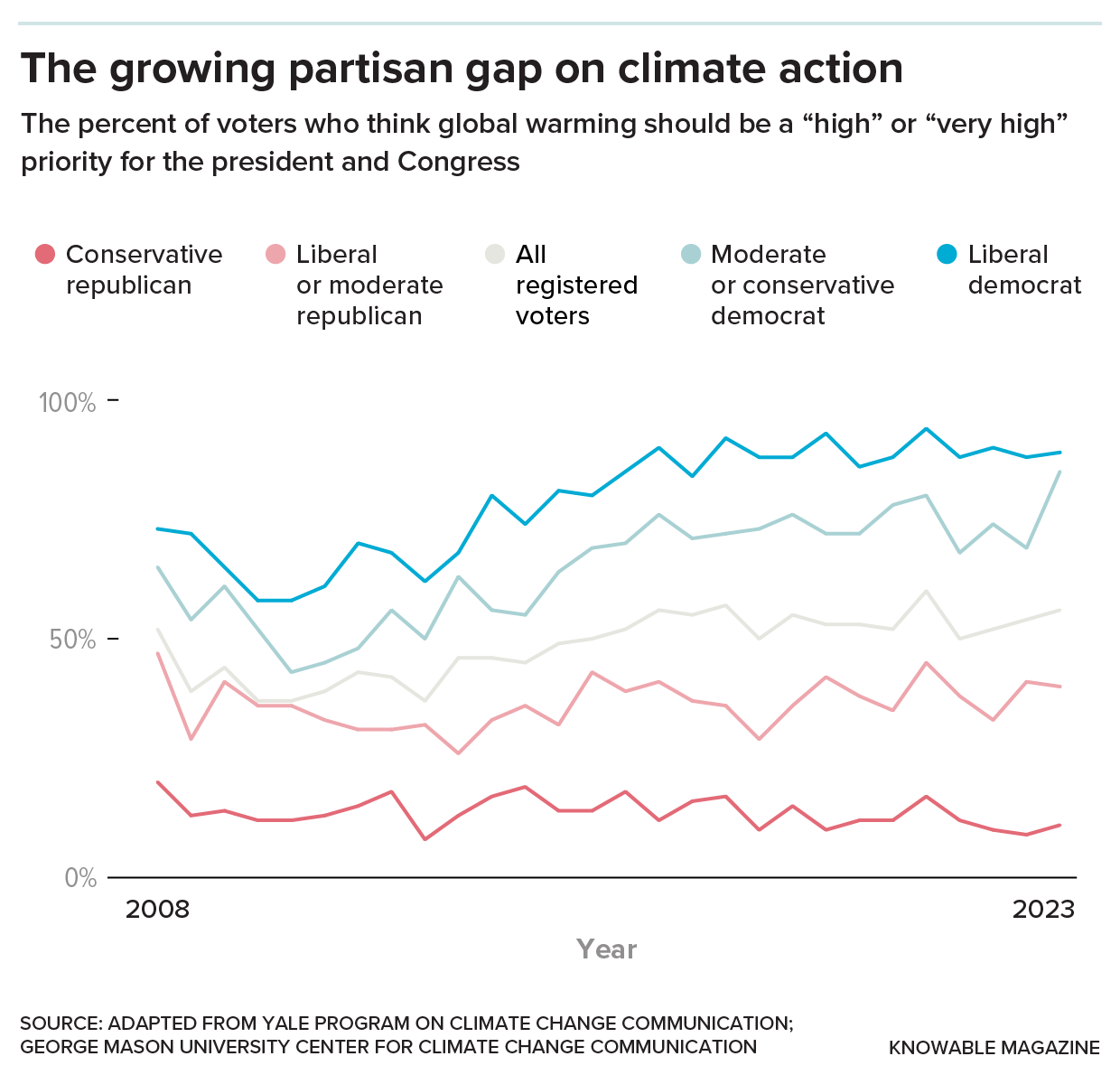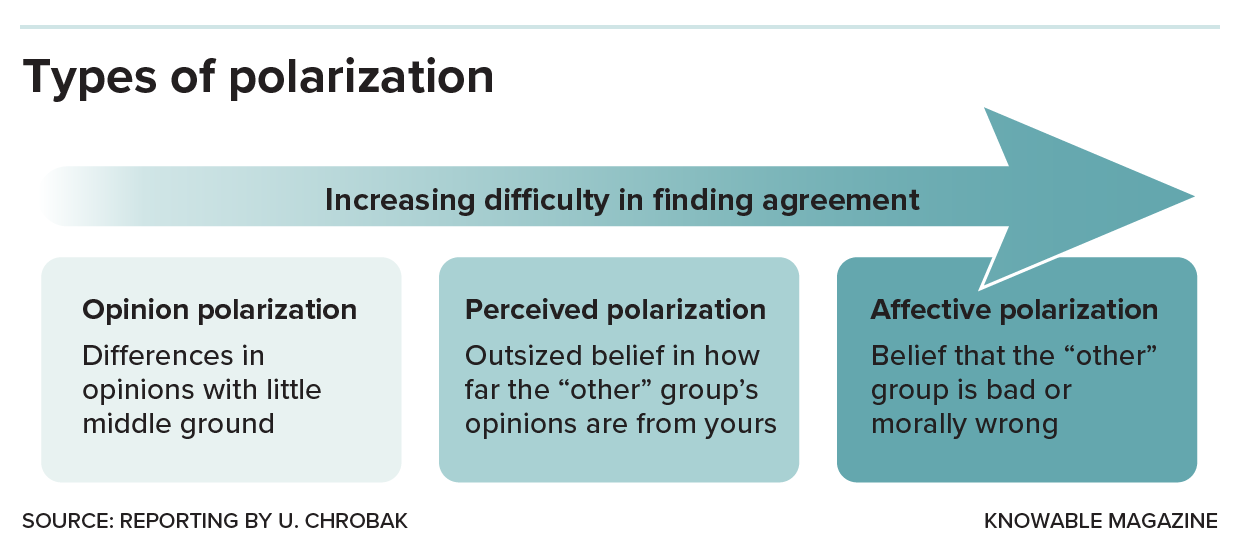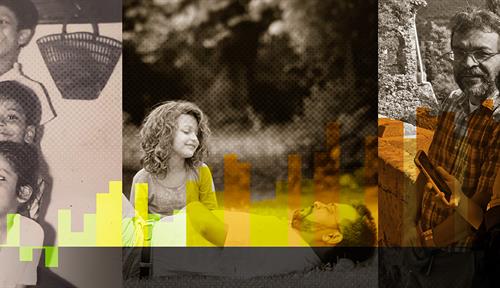How to overcome political polarization on climate change
Conversations — in real life — can help bridge the partisan divide, but the trick is to have some structure to the discussion, says a human ecologist
Support sound science and smart stories
Help us make scientific knowledge accessible to all
Donate today
Getting the facts straight about climate change is not enough: Even though there’s plenty of evidence on its many effects, people are more divided than ever on how to handle emissions. Truly addressing the climate crisis calls for more than technological know-how or reams of data: It requires understanding human decision-making.
Human ecologist Thomas Dietz of Michigan State University has devoted much of his career to understanding why people do — or don’t — take pro-environmental actions.
Among his specialties is polarization of people’s views around environmental issues, particularly climate change. This polarization happens when differences in opinions spread further and further apart. Eventually, “Everybody holds very strong views and very little is left in the middle,” he says. “When you begin to get nobody in the middle, it becomes harder to come up with compromises.”
In a review published in the Annual Review of Environment and Resources, he and coauthors discuss how polarization occurs, its impact on decision-making and how people may still be able to find common ground. Polarization occurs on multiple levels, which makes finding consensus challenging, but research suggests at least one way to combat it.
When people with opposing political leanings talk to each other in structured discussions about issues they disagree on, Dietz and other researchers have found that they soften their views, making room to cooperate even on divisive issues like climate policy. Not infrequently, he says, people come away from these discussions with the realization that their own views are not as different from others’ as they thought.
Dietz’s latest book, Decisions for Sustainability: Facts and Values, examines challenges to making good decisions and suggests ways we can do better, even in the face of polarization. He spoke to Knowable Magazine about his work and what it means for effective policy. This interview has been edited for clarity and length.
How does polarization happen?
Polarization comes about through the foibles of our processing of information. We’re all inclined to biased assimilation of information. When you hear a new fact, your acceptance of it depends on whether it’s consistent with what you already know.
The other process that leads to polarization is homophily — you like to hang out with people whose views are much like yours. So not only are you not likely to take in new information, you’re also not likely ever to even hear it, because you’re only talking to people who you think are like you.
What’s the state of polarization on climate change in the US?
Arguably, climate change is the most polarized issue in US politics right now. Democrats and Republicans are split more strongly on that issue than they are on any of the other issues they are split on. In polls where people have been asked about multiple issues — like climate change, gun control, reproductive rights, affirmative action, immigration — climate change is the most polarized of them all. Republicans are about 60 percent less concerned on standard questions about climate change than Democrats. A decade ago, that gap might have been maybe 20 percent.

Since 2008, Yale researchers have documented a growing divide between Democrats and Republicans on the importance of prioritizing action on climate change.
Research finds that polarization on climate is especially bad in the US. Why do you think that is?
Yes, in most studies, polarization of views about climate change is stronger in the US than in any other country. This may be because a two-party system facilitates polarization, because those who profit from fossil fuel use exert strong influence, and because of the overall pattern of polarization in views of any science that is linked to public policy. For the last 50 years, political strategies built on polarization have often been successful, encouraging more polarization. While these dynamics may not be unique to the US, they are strong here.
Because people are only listening to the sources that already agree with them and because there are motivated actors that really want to push their agenda, it takes a long time for scientific information to penetrate polarized political debates. There’s a lot of research out there that shows that the fossil fuel industry has worked very hard to keep climate change off the agenda, to push back against the notion that climate change is real, that it’s caused by humans, that it’s serious.
In your research you’ve identified other types of polarization that are maybe more insidious than just polarization of opinions. Could you talk about those?
There’s a second kind of polarization: perceived polarization. Perceived polarization is how different, if you’re in one of those polarized groups, you think your views are from the other group. Often we find that perceived polarization is bigger than the actual differences in people’s views.
The third piece is called affective polarization. That’s when you go from, “Those people really have the wrong views on climate change” to “They’re really not good citizens, they’re really not good people.” That, of course, is the most problematic. When you begin to think that the other side is not redeemable, it can become very, very hard to have functional democracy and try to work out compromises and move issues forward and learn from each other.

Dietz identifies three forms of polarization: opinion, perceived and affective. While it’s often possible to bridge divides in opinion polarization, finding agreement becomes increasingly challenging when perceived and affective polarization are at play.
Research from America and Australia suggests that people tend to overestimate the degree of climate denialism in their own populations. Why does this happen?
People tend to overestimate how polarized the country is. They think that there are far more folks that are distant from them and have exactly the opposite views. And they underestimate the number of people that are in the middle. That’s a pretty common phenomenon; our thought processes tend to oversimplify things and pick up on extreme values.
If you assume that other people are very, very far from your view, then it’s winner take all — you’re going to assume the other people will not compromise with you. The process of trying to find a common understanding and ways forward that meet the needs of everybody breaks down.
How do we overcome climate misperceptions and polarization?
I strongly believe that getting people to talk with each other and with scientists as we analyze problems is a really good process. If you get people into structured discussions where facilitators help the process along, those can have important depolarizing effects.
“When you begin to think that the other side is not redeemable, it can become very, very hard to have functional democracy and try to work out compromises and move issues forward and learn from each other.”
You draw a random sample of people, invite them to get together, typically for a day or a day or two, in a neutral space — a local auditorium or a church basement. You assess people’s opinions beforehand and then you assess their views after they’ve had discussions with others.
Discussions are usually facilitated by a trained mediator, so people get to hear each other’s views in a civil way. And I think that works for most people. When people disagree strongly but don’t have strong views about the ethics and motivations of people who disagree with them, these discussion processes can allow people to find common ground and move forward from them.
On many issues, including climate change, those kinds of processes really do have a big impact on the people who participate. The challenge is: How do you then multiply that back out to the whole population? And I don’t think we know that.
What’s an example of how these talks work in practice?
I've often had everybody individually, privately write down the key ideas that they have on the issue. And then everybody goes around one at a time and offers one idea, and you keep going until you run out of ideas. The secret to that is the ownership decreases. By the time you're on the second round, people forget who put that idea up on the board. Then everybody talks about one issue. A whole lot of little steps help keep it from becoming the kind of shouting match that you can get if you just let people go at it.
Why do these structured discussions work to change people’s minds and even depolarize?
In deliberation, people deal with other real, complex, multifaceted people in ordinary conversation. And the rules of the process keep things from escalating. This reduces stereotyping and demonizing the hypothetical “other,” because the other is a person, not an abstraction. But we need more research on this and experimentation on ways to scale up.
Do you think social media, which tends to amplify extreme views, is making polarization worse?
Social media may exacerbate this. The evidence is very mixed so far. It’s not as bad as we might fear, but that doesn’t mean it’s not going to get worse. It is likely that the new potential of AI will make it a lot easier to generate polarizing bits of information to post, and also make it more effective to identify groups to target. People who have motivations to push various points of view have more potential to use their money to buy those kinds of AI and other resources to really push social media.
How do you think about polarization when considering a proposed climate policy and whether or not it will be successful?
This is where you get into problems with political gridlock. For example, economists tell us that putting a tax on carbon emissions is one of the best ways to reduce greenhouse gas emissions. Except that we’ve seen repeatedly in the US, going back to the Clinton Administration and at the state level, there is no way you’re going to get, under current politics, a carbon tax. I wish it weren’t so. But to put a lot of energy into trying to get a carbon tax right now doesn’t seem like a good way to go forward.
But if, say, a carbon tax really could be effective in curbing emissions, should we not try to convince people to change their mind on it?
If politics is blocking important initiatives that would help solve environmental problems, then we need to do two things: figure out what we can do now despite the politics, and what we can do to change the politics. It’s not either/or, it’s both/and.
How can we apply what you’ve learned from the structured discussion research to conversations about climate change in our daily lives?
I used to codirect a climate adaptation center in the Great Lakes. We’re already seeing some severe climate-related problems in rural areas in Michigan. Cherry growers would get unusually warm weather early in the spring, the cherries would all blossom, and then they get a hard freeze. Some years they lost the entire cherry crop.
We would always begin conversations with farmers with “This is the record of the temperatures for 100 years from a weather station you know.” We didn’t talk about climate models. We would just say to these communities, “Something’s going on here and it affects you.” And then we usually can find agreement on reasonable strategies for adapting to those problems.
Once people begin to explore that, they realize that if things keep getting worse, adaptation is going to be very hard and very expensive. We would find, often, over a period of a couple years, people would come around completely. Those cherry farmers got really interested in the climate models. You know, “What’s going to happen over the next 35, 50 years? Because when I plant cherry trees, I have to think on a 25-year time frame.”
Avoid being confrontational in ways that make people defensive. Energy efficiency and renewables are good for the climate, but they are also good for the economy, for national security, for reducing air pollution, for creating new jobs, for energy independence. So even if someone rejects climate change as an issue, there are other ways to discuss efficiency and renewables.
Invoking personal experience helps because it takes the conversation away from abstract, polarized politics to ordinary people and their lives. I often say things like, “Those solar panels were one of the best investments our family ever made,” or “It seems like the lake is freezing over less and less.” The key seems to be finding common ground.
10.1146/knowable-031324-1
TAKE A DEEPER DIVE | Explore Related Scholarly Articles






